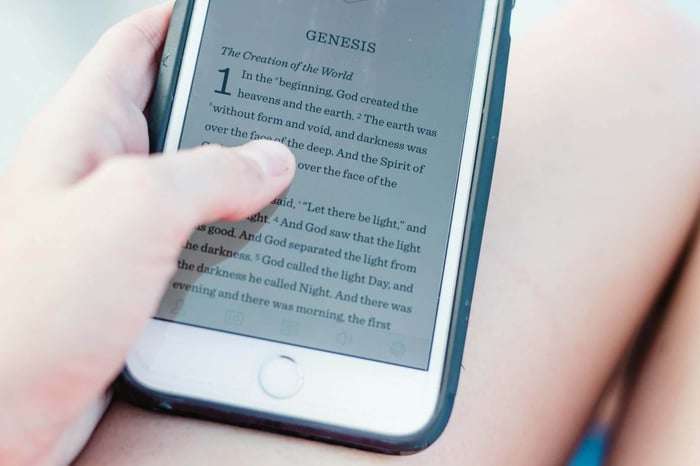Table of Contents
The World English Bible (WEB): A Comprehensive Overview
The World English Bible (WEB) is a modern English translation of the Bible that stands out for its accessibility and public domain status. This blog post delves into the history, copyright status, translation methodology, and how it compares with other Bible versions.
History of the World English Bible
The translation work for the World English Bible began in 1994, spearheaded by Michael Paul Johnson, who felt a divine calling to create a modern English translation of the Bible that would be freely available to everyone. Johnson, who lacked formal training in biblical languages, dedicated himself to studying Greek and Hebrew and utilized scholarly works to aid his translation efforts. The initial drafts were shared on Usenet and a mailing list, where he received feedback and suggestions from volunteers 1. The first draft of the WEB was completed in 1997, but it was not until 2020 that the translation was deemed complete. Over the years, numerous volunteers contributed to the project, helping to refine and modernize the language of the American Standard Version (ASV) of 1901, which served as the base text for the WEB 1-4.
Translation Methodology
The World English Bible employs a translation philosophy known as formal equivalence, which aims to stay as close as possible to the original wording and structure of the source texts. The New Testament is based on the Byzantine Majority Text by Robinson and Pierpont (1991), while the Old Testament is derived from the Biblia Hebraica Stuttgartensia, with some influence from the Septuagint and Dead Sea Scrolls 1-2. The translation process involved multiple stages of editing and proofreading. An initial automated pass updated approximately 1,000 archaic words and phrases. Subsequent manual passes added quotation marks, adjusted punctuation, and checked the translation against the Greek and Hebrew texts where significant textual variants or unclear meanings were present 15.
Features and Editions
The WEB is available in several versions, including American and British styles of English. It also offers different editions based on the selection of books including:
- Standard Ecumenical Edition: Contains all the books used by various Christian denominations, arranged in the canonical order of the Old Testament, a collection of Deuterocanon/Apocrypha books, and the New Testament.
- Protestant Edition: Omits the Deuterocanon/Apocrypha books, leaving only the 66 books of the Old and New Testaments.
- Catholic Edition: Presents the books in the traditional Catholic order, using only the Esther and Daniel with additions translated from the Greek Septuagint, and omits books not recognized as canonical or deuterocanonical by the Roman Catholic Church 4.
Copyright and Licensing
One of the most distinctive features of the World English Bible is its public domain status. This means that the text is not copyrighted, allowing anyone to freely copy, publish, distribute, and use the WEB without any restrictions. However, the name "World English Bible" is a trademark of eBible.org, which ensures that any derivative works that substantially alter the text cannot use the same name to avoid confusion 2 8.
Comparison with Other Bible Versions
The World English Bible is often compared with other modern English translations. Here are some key points of comparison:
- American Standard Version (ASV): The WEB is a direct update of the ASV, modernizing its language while maintaining its formal equivalence approach.
- New International Version (NIV): The NIV uses a thought-for-thought translation philosophy, which can make it more readable but less literal compared to the WEB.
- English Standard Version (ESV): Like the WEB, the ESV aims for formal equivalence but is copyrighted, limiting its free distribution.
- King James Version (KJV): The KJV is known for its majestic language but uses older manuscripts and has archaic language, which the WEB updates for modern readers 3 15 16.
Critical Reception
The World English Bible has been praised for its accessibility and adherence to formal equivalence. However, some critics note that its language can sometimes be less natural-sounding due to its literal approach. Despite this, the WEB is valued for being a modern, free, and public domain translation that fills a unique niche in the landscape of English Bible translations 15.
Conclusion
The World English Bible significantly contributes to biblical translations, offering a modern, freely accessible version of the Holy Scriptures. Its history, translation methodology, and public domain status make it a valuable resource for individuals and organizations seeking an unrestricted, accurate translation of the Bible. Whether for personal study, teaching, or distribution, the WEB provides a reliable and accessible option for English-speaking Christians worldwide.
Sources:
- (1) World English Bible - Wikipedia
- (2) World English Bible (WEB) - Version Information - BibleGateway.com
- (3) Compare Bible Translations: Read All Versions Side by Side
- (4) World English Bible
- (5) What Bibles on Bible Gateway are in the public domain?
- (6) Did You Know? How to Compare Different Bibles Side-by-Side on ...
- (7) Bible History - Bible History
- (8) World English Bible - eBible.org
- (9) Online Parallel Bible - Compare Bible Verse Translations
- (10) World English Bible History - eBible.org
- (11) The World English Bible (WEB) FAQ - eBible.org
- (12) The most accurate version of the bible : r/Bible - Reddit
- (13) Read the World English Bible Free Online
- (14) Compare Bible Translations - CSB
- (15) What is the World English Bible (WEB)? | GotQuestions.org
- (16) What is the best Bible translation to read? : r/TrueChristian - Reddit




